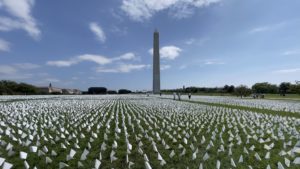In the US in recent weeks there has been a disturbing milestone – over 1 million deaths from COVID-19 – and several tragic events, i.e., mass shootings in New York and Texas. Although quite different in nature, these developments, I believe, highlight central cultural themes in contemporary America related to individual freedom of choice and to attitudes towards authorities, particularly as represented in science and the government. The events are disturbing and tragic but also worrisome in that the power of these cultural themes appears to be growing, with potentially catastrophic future impacts on public health and safety.
A recent article in the NY Times highlighted the fact that Australia’s Covid death rate has been one-tenth of that in the US. The article points to a “lifesaving trait that Australians displayed from the top of government to the hospital floor, and that Americans have shown they lack: trust, in science and institutions, but especially in one another.” That trust, present in Australia, absent in the US, was “fundamental in getting people to change their behavior for the common good to combat Covid, by reducing their movements, wearing masks and getting vaccinated”. While Australians followed community rules, sharing a mutual concern for others (“mateship”), many Americans insisted on their personal freedom not to wear a mask or to get vaccinated. For many in the US that individual freedom of choice trumped all other factors, including social responsibility.
That obsession with personal freedom to act, despite potential dangers to others, is a cultural theme that carries over to gun ownership in the US. There is strong evidence that the widespread lack of restrictions on owning firearms of all types, including military-style assault weapons, leads to more and more gun deaths, including suicides. Efforts at the federal level to institute restrictions have failed repeatedly over the years. At the recent convention of the NRA (National Rifle Association), NRA leaders and attendees responding to the school shooting in Uvalde, Texas, were, according to an article in the Texas Tribune, “unified in their belief that the shooter’s access to guns was not to blame”. Instead they pointed to cultural issues:
They attributed this attack and others to a broader breakdown in society wrought by the removal of God from public schools, the decline of two-parent households, a perceived leniency toward criminals, social media and an increase in mental illness. They described feeling ostracized for their beliefs, and not just those on guns. For their refusal to get the COVID-19 vaccine. For their objections to gay people serving as teachers. For their belief in disciplining children through spanking.
Instead of restricting sales of guns, NRA adherents focused on cultural issues and “framed any attempt at curtailing gun rights as chipping away at their freedoms”. But just like refusing to be vaccinated puts others at risk, the insistence on the absolute freedom to own guns makes them so widely available that it seems inevitable that public safety is at risk, as the raft of mass shootings has shown.

Topic: Commenting on “Cultural themes in US society and their deadly consequences” blog post
I really enjoyed reading this article. It pointed out how Americas have an obsession with their personal freedom, even though it causes danger to others. It made me think about why this is an issue in America. Since they don’t trust the government, Americans take matters into their own hands, such as having guns and not wearing masks during a pandemic.
But what stood out most to me was the lack of restrictions on firearm ownership and the belief that owning a gun will protect you and your family. However, if you think about it, most crimes that occur in this country are caused by guns.
Examples:
The Roob Elementary School shooting killed NINETEEN children and two adults in Uvalde, Texas.
The Buffalo Supermarket shooting killed 10 people while 3 were injured.
The Sandy Hook Elementary School shooting killed 20 children and 6 adults.
The Marjory Stoneman Douglas Highschool shooting that murdered 17 teenagers and injured 17 others
The list of mass shootings continues to grow. In 2022, there had been over 200 plus mass shootings. The issue shouldn’t be whether or not you lose your “freedom”, but rather, how many more lives must be lost before there is a genuine change in society. We’ve seen change around the world after a mass shooting, the UK for example, banned the use and sale of guns after ONE mass shooting. Ironically, Canada banned the sale of guns after the Uvalude school shooting, even though the incident never happened there. These countries see that guns are deadly weapons and shouldn’t just be given to anyone.